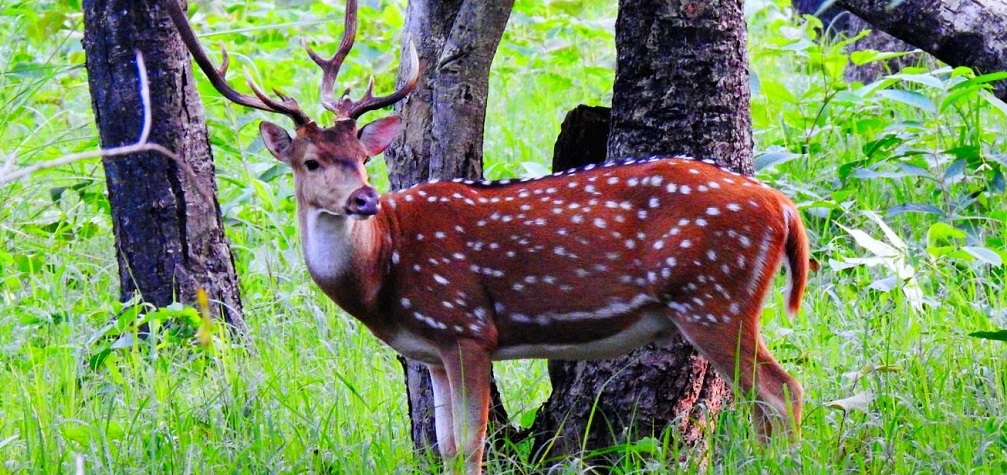Valmiki Safari Booking: Essential Information for Travelers

Valmiki Tiger Reserve is located in the West Champaran district of Bihar, India. It was established in 1990 and is one of the prominent wildlife reserves in the state. The park is named after the ancient sage Valmiki and is known for its diverse flora and fauna. The reserve is rich in biodiversity, with a variety of vegetation including tropical wet evergreen forests, tropical semi-evergreen forests, and grasslands. The park is situated amidst the Gangetic plains, making it ecologically significant. Valmiki Tiger Reserve is home to various species of wildlife, including Bengal tigers, Indian leopards, Indian elephants, wild boars, sambar deer, barking deer, and various species of primates. It's also a haven for birdwatchers with a variety of avian species. The reserve is part of Project Tiger, a conservation program launched in India to protect the Bengal tiger. Valmiki Tiger Reserve plays a crucial role in the conservation efforts for this endangered species.
The region around Valmiki Tiger Reserve is often associated with the Ramayana, an ancient Indian epic. There are sites within the reserve and nearby that are believed to be associated with events from the Ramayana.
Jeep Safari in Valmiki National Park
Jeep safaris are a popular and thrilling way to explore the diverse wildlife and natural landscapes in the national parks of India. Many national parks across the country offer Jeep safaris as a primary means of wildlife viewing. Likewise, Valmiki National Park also offers open jeep safari activity in its jungle to explore the untouched part of the jungle. Here are some key points regarding Jeep safari in Valmiki national parks in India:
Advance Permit Booking & Entry Ticket is Mandatory :> Visitor need mandatory entry permits to enter national park, and booking a Jeep safari in advance is always advisable. Permits can often be obtained online through our website. It has very good user friendly booking calendar which will definitely help you to execute the safari booking process with hassle free experience.
Strict to Safari Timings: Jeep safari have specific timings, usually during the early morning or late afternoon when wildlife is more active. The timings may vary based on the specific national park and seasonal changes. In Valmiki Tiger Reserve safari is conducted in two shifts morning as well as in evening shifts.
Duration of the Jungle Safari: Jeep safaris typically have a fixed duration, ranging from a few hours to half a day. In Valmiki Tiger Reserve jeep safari enters into the park for three hours. Please note that longer safaris or multiple safaris on different days may provide a more comprehensive wildlife experience.
Expert Guides and Naturalists: Trained guides or naturalists accompany Jeep safaris to provide information about the flora, fauna, and ecosystems. Expert guides enhance the safari experience by helping spot wildlife and sharing insights about the park.
Chances of Wildlife Spotting: Jeep safaris offer the chance to spot a variety of wildlife, including mammals, birds, and reptiles. Depending on the exact timing, you may encounter animals like tigers, elephants, deer, leopards, and numerous bird species.
Wildlife Snapping: Wildlife photography enthusiasts can capture stunning moments during Jeep safaris. However, it's important to follow guidelines to avoid disturbing the animals.
Some Mandatory Rules and Regulations: Visitors are expected to follow park regulations, which may include staying within designated paths, maintaining a safe distance from wildlife, and avoiding littering.
Before planning a Jeep safari in Valmiki Tiger Reserve, it's crucial to check the specific rules and regulation, complete booking procedure and obtain the necessary permits. Additionally, consulting with our executives or tour operators can provide up-to-date information on timings, availability, and any specific requirements for Jeep safaris in Valmiki Tiger Reserve.
Things to Carry at the time of Jeep Safari
- Booking Voucher issued by us
- ID Proof photo printed is mandatory
- Water Bottle
- Sunglasses
- Sunscreen
- Umbrella (in case of rainy season or summers)
Best time for Jeep Safari in Valmiki Tiger Reserve
The best time for a Jeep Safari in Valmiki Tiger Reserve, or any national park in India, depends on various factors, including weather conditions, wildlife behavior, and the park's specific characteristics. For Valmiki Tiger Reserve in Bihar, India, here are general recommendations:
The Months November to February: This is considered one of the best times for a Valmiki Tiger Reserve Jeep Safari. The weather is relatively cool, making it more comfortable for visitors. Wildlife is often more active during the cooler hours of the day.
Spring Season (March to April): Spring is another good time for a Jeep Safari. The weather starts getting warmer, and vegetation becomes lush, making it easier to spot wildlife.
Monsoon Season (June to September): Monsoon season can be challenging for safaris as heavy rainfall may lead to road closures and difficulties in navigation.
However, the post-monsoon period, from September onward, can be a good time as the landscape is refreshed, and wildlife is active.
Summer Season (May to June): Summer can be hot in this region, but it's still a viable time for safaris. Animals tend to gather around water sources during this season, increasing the chances of sightings.
It's essential to note that wildlife sightings are not guaranteed, and the best time can also depend on personal preferences. Some visitors prefer the lush greenery of the monsoon season, while others may prefer the drier months for better visibility.